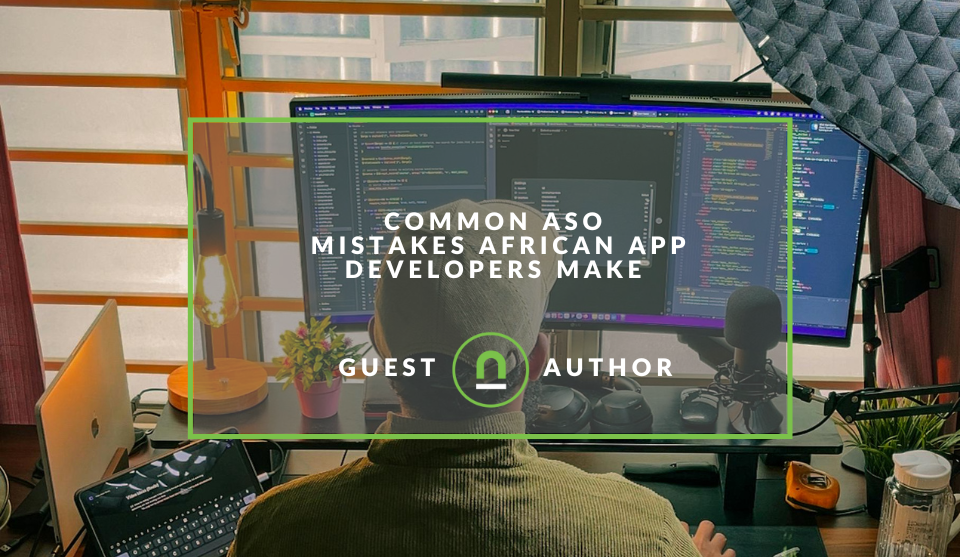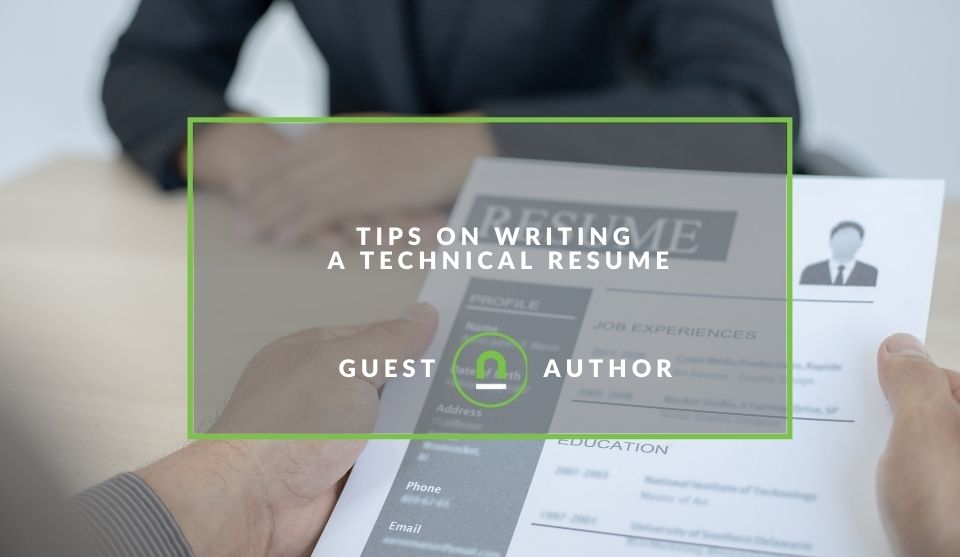Recent posts

Press Releases
Africaworks Accelerates The Rollout Of Real Estate Investment Platform
20 January 2026

Press Releases
80% of Gen-Zers Would Marry an AI
19 January 2026

Press Releases
The Rise of AI Computing Power Assets
16 January 2026

Industry Experts
Common ASO Mistakes African App Developers Make
09 January 2026
Popular posts
Extravaganza
Trending Music Hashtags To Get Your Posts Noticed
24 August 2018
Geek Chic
How To Fix iPhone/iPad Only Charging In Certain Positions
05 July 2020
Extravaganza
Trending Wedding Hashtags To Get Your Posts Noticed
18 September 2018
Money Talks
How To Find Coupons & Vouchers Online In South Africa
28 March 2019
Tips on Writing a Technical Resume
17 July 2021 | 0 comments | Posted by Dimitar Karamarinov in Talent Agents
With tech jobs on the rise and the talent pool not keeping up, you might find yourself looking at a career change and in need of a sturdy and well-structured technical resume.
In this guide, at nichemarket, we’ll take a look at tips and common resume mistakes in writing a technical resume that’ll get you that desired, hard interview, yet of high satisfaction, and outline the best practices for getting the coveted foot in the door!
From the cover letter to the format and experience you list, every detail plays a role in how hiring managers will perceive your ability to do the job. I know it’s daunting to google around for examples of successful resumes, but rest easy, as this will serve as your ultimate guide to writing a solid technical resume.
Let’s get started!
Attention to detail
Imagine you’ve found a product you love, go to its website and find the design outdated, the product description has errors and misspellings, and technical specs are hard to grasp. The same applies to a resume of grammar or spelling mistakes, and you should always quadruple-check for typos and wording.
Unless the product is of high necessity, you might think twice about purchasing, right?
The same logic applies to a resume, especially when applying for a highly specialized job. To make the best first impression, you’ll want to make sure the grammar, punctuation, and content make sense. Have a second or third trusted person look it over for any potential errors and run it through an app like the Hemingway editor to check for readability.
The other area within attention to detail that’s important is the layout and design. Take the time to provide clear headers for information, bold text where needed, and ensure everything lines up in a clean, concise way.
Using a resume template might be helpful here, but it isn’t a strict requirement in the tech world. Just make sure everything looks consistent across the page. Of course, not all job applications should be one-pagers, but it’s becoming an established trend in recent years.
First impressions do matter, and you want to start the interview process with your best foot forward.
Include a cover letter
There’s a myth circulating the web that hiring managers don’t read cover letters.
While some hiring managers might not read them, others will, and you’ll want to account. So make sure you put effort into yours! This is an opportunity to drive home the value you bring to the role with a couple of crucial facts.
- Do not rehash your resume!
- Use your cover letter to showcase that you understand the problem they need to solve and how you can help.
- Touch on the newly-established “COVID normal”, ability to work from home or have a nomadic lifestyle and do a better job than people do in an office.
- If you don’t have direct experience for the role, you’re applying for. Don’t stress it!
- You add value by being a problem solver and a quick learner. What you might lack in professional experience you make up for in hitting the ground running, freelance experience, or in portfolio projects you’ve built in your spare time. This all shows initiative and is of value for a prospective employer. So include this instead.
- Remember to show the value you bring to the table, but do it concisely, to the point, and in a conversational manner. You want to respect the hiring manager’s time and show that you communicate well. Think big picture, too. Save the details of your previous work for the interview.
Format is key
Make it easy for the hiring manager to read your resume. Part of solid staff and business performance is the swift recruitment process, especially with advancements in resume parsing technology and applicant tracking systems.
The format makes all the difference. The tech industry is more concerned with relevance and experience than education, but it doesn’t mean you shouldn’t include training such as online courses on your resume. Stick with the tried-and-true reverse chronological order.
Technical resumes are also unique in that you’ll often include a section on technical skills and describe your proficiency in each. Here are the sections you must have on a classic resume to make it to and pass the interview.
Include Contact Info: Bold, front & centre
You will be surprised at how often resumes don’t include obvious ways to get a hold of applicants. This information should be the front, centre, and somewhere at the top of your resume.
Be sure to include:
- Name
- Phone Number
- Links to a portfolio, Linkedin, Github (if applicable)
Suppose you don’t have an online portfolio yet. Start one. Whether you’re a web developer or an IT specialist, it’s a great way to include more relevant information on your abilities. They say the resume serves as a postage stamp with very little room for detail.
Use your portfolio to expand on your relevance for the role.
Describe what you bring to the new role
This might take two forms and can either be a summary or an aim. The resume summary is for someone who has years of experience in the field and who can show how their experience equates to value in the new role. Surely a CTO will ask a lot on a follow-up interview, but you need to highlight details in advance.
Here’s a great resume summary example:
“Cisco Certified Network Security Engineer with 5+ years experience. Seeking to improve network security across enterprise organizations. At NBC Global, led successful migration to Cisco-only firewalls. Cut security risk by 60% and boosted network speed by 37%.”
The formula here is straightforward.
- List the experience you bring to the role, what your objective is.
- List the significant impact you left on your most recent organization.
A resume objective is ideal for someone new to the role or field they’d like to enter. The objective will include language that uses current skills or interests to convey the value add for this new role.
Here’s an example of a resume objective:
“Hard-working front-end developer, interested in providing user interface solutions for Lookas Global. Have freelanced and coded projects for small businesses, including e-commerce sites and user intranets for distributors.”
Also straightforward. A nice description of how you would work in your new role, what you’re interested in and what impact you’ve had in your projects.
List relevant work experience & portfolio projects
You might have some; you might not. You’ll want to include your years of experience if you have it. If not, this is a great section to include projects and descriptions of your work to show your relevance for the role.
For relevant work experience, provide 3 - 4 quantifiable bullet points for each role and what impact you had at these organizations.
Here’s a great example of job experience:
Network Security Engineer
NBC Global
2014 - 2017
- Handled Network Security planning for a major television broadcaster. Directed all hardware and software installation, maintenance, and upgrades.
- Spearheaded the successful company-wide switch to Cisco ASA firewall devices. Upgraded 100+ firewalls, under budget, and ahead of schedule.
- Implemented IT risk management plan to harden system security, including new routing protocols, new end-user security measures. Reduced security risk by 60%.
The bullet points are concise and build on the great resume summary we started with. The impact is clear and quantifiable, and as a hiring manager, I’d have little doubt that this candidate can make things happen.
Here’s a quick screenshot for a software developer who doesn’t have direct experience yet. This is a section to add the above work experience:

Example of a tech resume
This shows the relevant technologies used, and each of these projects can be found on GitHub if the hiring manager is interested.
Include technical & key skills to stack odds in your favour
Each company in the tech sector uses a different tech stack. This might be a headache if you’re looking to get started in the industry, but the best thing here is that the skills are often transferable. It goes without saying that you should list your skills!
The format of the skills section will depend on the role you’re applying for.
For a web development role, you might include front-end tech, back-end tech, other skills, and strategies. For a network engineer, you might include devices, protocols, operating systems, and strategies.
This is a great opportunity to include keywords relevant to the role. Do your research and include them if you know the tech.
Beware, though; anything listed on your resume is fair game for inquiry during the interview. Make sure you know your stuff or touch upon technologies you might not be current on.
Here’s a screenshot of an awesome skills section from a full stack web developer resume:

Example of a developer resume
This lists skills logically and breaks down technologies according to where they’re used.
If you’re set on including skills that you might not have used in a while, be sure to include a metric to help your interviewer determine proficiency.
Don’t forget education
While experience is king in the tech world, education might be your golden ticket to the interview. Even if your degree isn’t tech-specific, be sure to include it. As a general rule, don’t include GPA unless it’s over 3.0 on a 4.0 scale.
In a similar way to your work experience, be sure to include impact in your education where applicable. How does your schoolwork tie into the job you’re seeking?
Here’s a great example of an impactful school experience:
BS, Computer Science, 2009 - 2013
University of Southern California
- Received Degree in Computer Science with an emphasis in Artificial Intelligence.
- Excelled in computer science coursework.
- Wrote school blog article on A* search algorithm which was linked to by two local start-up corporations.
Assuming this person is applying for a software engineer role, this works great! Shows passion and interest in the field and sets a nice foundation for future work experience.
In this section, you can include any certificates you may have earned from online courses or programs you’ve completed. Many people wonder if these certificates are needed to get a job, but they aren’t.
A strong portfolio that validates your skills are significantly more important.
That’s it!
With these steps, you are well on your way to getting that interview and making the career change you’ve always dreamed of!
Tell us your story
Would you like to write for nichemarket just like Dimitar has? Find out how to submit a guest post and when you're ready, you can contact us.
Are you looking to promote your business?
South African recruitment businesses can create your free business listing on nichemarket. The more information you provide about your business, the easier it will be for your customers to find you online.
Registering with nichemarket is easy; all you will need to do is head over to our sign up form and follow the instructions. If you require a more detailed guide on how to create your profile or your listing, then we highly recommend you check out the following articles.
Recommended reading
If you enjoyed this post and have time to spare, why not check out these related posts and dive deeper down the rabbit hole that is career advice.
- How to List Online Courses on Your Resume
- How Does Resume Parsing Speed up The Recruitment
- Study Shows Hard Interviews Result In Better Jobs
- Why Your Resume Should Be One Page
- 5 Things to Know Before Moving to Africa for Work
- 7 Tips For Recruiting Foreign Workers
- Myths About Remote Interviews
- 9 Recruiting Tactics For Bold Recruiting Leaders
You might also like
The Rise of AI Computing Power Assets
16 January 2026
Posted by Rehman Ali in Press Releases
An introduction to Cloud mining and monetising cloud computing as DLMining Reshapes Wall Street's New Anti-Inflation Investment Paradigm
Read moreWhere You Can Find International Remote Jobs For South Africans
23 December 2025
Posted by Mia Stewart in Press Releases
Want to find international remote jobs for South Africans? Look no further, in this breakdown we look at your options so you can start applying for W...
Read more{{comment.sUserName}}
{{comment.iDayLastEdit}} day ago
{{comment.iDayLastEdit}} days ago
 {{blogcategory.sCategoryName}}
{{blogcategory.sCategoryName}}

